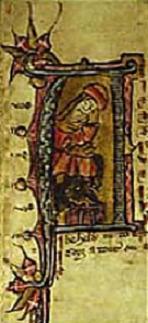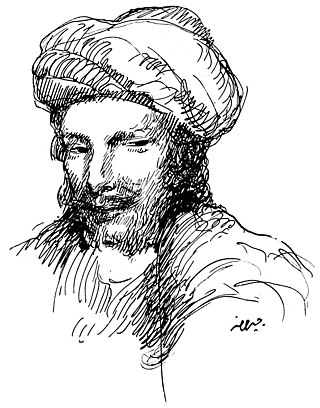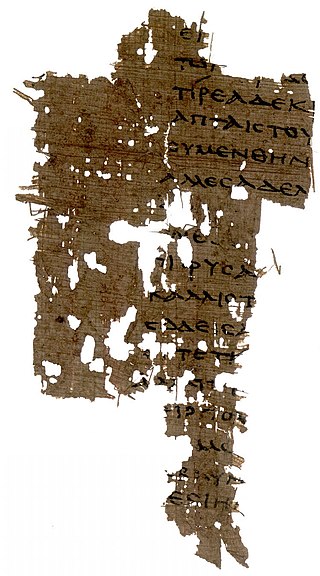
Publius Vergilius Maro, usually called Virgil or Vergil in English, was an ancient Roman poet of the Augustan period. He composed three of the most famous poems in Latin literature: the Eclogues, the Georgics, and the epic Aeneid. A number of minor poems, collected in the Appendix Vergiliana, were attributed to him in ancient times, but modern scholars consider his authorship of these poems to be dubious.
The Wiccan Rede is a statement that provides the key moral system in the neopagan religion of Wicca and certain other related witchcraft-based faiths. A common form of the Rede is "An ye harm none, do what ye will" which was taken from a longer poem also titled the Wiccan Rede.

Publius Ovidius Naso, known in English as Ovid, was a Roman poet who lived during the reign of Augustus. He was a younger contemporary of Virgil and Horace, with whom he is often ranked as one of the three canonical poets of Latin literature. The Imperial scholar Quintilian considered him the last of the Latin love elegists. Although Ovid enjoyed enormous popularity during his lifetime, the emperor Augustus exiled him to Tomis, the capital of the newly-organised province of Moesia, on the Black Sea, where he remained for the last nine or ten years of his life. Ovid himself attributed his banishment to a "poem and a mistake", but his reluctance to disclose specifics has resulted in much speculation among scholars.

The Metamorphoses is a Latin narrative poem from 8 CE by the Roman poet Ovid. It is considered his magnum opus. The poem chronicles the history of the world from its creation to the deification of Julius Caesar in a mythico-historical framework comprising over 250 myths, 15 books, and 11,995 lines.

An acrostic is a poem or other word composition in which the first letter of each new line spells out a word, message or the alphabet. The term comes from the French acrostiche from post-classical Latin acrostichis, from Koine Greek ἀκροστιχίς, from Ancient Greek ἄκρος "highest, topmost" and στίχος "verse". As a form of constrained writing, an acrostic can be used as a mnemonic device to aid memory retrieval. When the last letter of each new line forms a word it is called a telestich; the combination of an acrostic and a telestich in the same composition is called a double acrostic.
In Irish mythology, Neman or Nemain is the spirit-woman or goddess who personifies the frenzied havoc of war. In the ancient texts where The Morrígan appears as a trio of goddesses — the three sisters who make up the Morrígna — include Macha and Badb; Nemain is strongly associated with Badb with whom she shares a husband, Neit. Nemain may be an aspect of Badb.

The Adventures of Tom Bombadil is a 1962 collection of poetry by J. R. R. Tolkien. The book contains 16 poems, two of which feature Tom Bombadil, a character encountered by Frodo Baggins in The Lord of the Rings. The rest of the poems are an assortment of bestiary verse and fairy tale rhyme. Three of the poems appear in The Lord of the Rings as well. The book is part of Tolkien's Middle-earth legendarium.

William Langland is the presumed author of a work of Middle English alliterative verse generally known as Piers Plowman, an allegory with a complex variety of religious themes. The poem translated the language and concepts of the cloister into symbols and images that could be understood by a layman.

Abū Nuwās al-Ḥasan ibn Hānī al-Ḥakamī was a classical Arabic poet, and the foremost representative of the modern (muhdath) poetry that developed during the first years of Abbasid Caliphate. He also entered the folkloric tradition, appearing several times in One Thousand and One Nights.

The Cantos by Ezra Pound is a long, incomplete poem in 120 sections, each of which is a canto. Most of it was written between 1915 and 1962, although much of the early work was abandoned and the early cantos, as finally published, date from 1922 onwards. It is a book-length work, widely considered to present formidable difficulties to the reader. Strong claims have been made for it as the most significant work of modernist poetry of the twentieth century. As in Pound's prose writing, the themes of economics, governance and culture are integral to its content.
"Errantry" is a three-page poem by J.R.R. Tolkien, first published in The Oxford Magazine in 1933. It was included in revised and extended form in Tolkien's 1962 collection of short poems, The Adventures of Tom Bombadil. Donald Swann set the poem to music in his 1967 song cycle, The Road Goes Ever On.
Flidas or Flidais is a female figure in Irish Mythology, known by the epithet Foltchaín. She is believed to have been a goddess of cattle and fertility.
Pearl of Great Price may refer to:
"Maxims I" and "Maxims II" are pieces of Old English gnomic poetry. The poem "Maxims I" can be found in the Exeter Book and "Maxims II" is located in a lesser known manuscript, London, British Library, Cotton Tiberius B i. "Maxims I" and "Maxims II" are classified as wisdom poetry, being both influenced by wisdom literature, such as the Havamal of ancient Germanic literature. Although they are separate poems of diverse contents, they have been given a shared name because the themes throughout each of the poems are similar.
Talhaearn Tad Awen, was, according to medieval Welsh sources, a celebrated British poet of the sub-Roman period. He ranks as one of the earliest, if not the earliest, named poets to have composed and performed in Welsh. The better known poets Aneirin and Taliesin, who may have been slightly younger contemporaries, also belong to this early generation, the first of those known to modern scholars as the Cynfeirdd. Whereas medieval Welsh manuscripts preserve verse composed by or otherwise ascribed to the latter two figures, no such work survives for Talhaearn and in fact, his former fame seems to have largely vanished by the later Middle Ages.

The Kildare Poems or Kildare Lyrics are a group of sixteen poems written in an Irish dialect of Middle English and dated to the mid-14th century. Together with a second, shorter set of poems in the so-called Loscombe Manuscript, they constitute the first and most important linguistic document of the early development of Irish English in the centuries after the Anglo-Norman invasion of Ireland. The sixteen poems contain both religious and satirical contents. They are preserved in a single manuscript, where they are scattered between a number of Latin and Old French texts. The conventional modern designation "Kildare poems" refers both to the town of Kildare in Ireland, which has been proposed as their likely place of origin, and to the name of the author of at least one of the poems, who calls himself "Michael (of) Kildare". The poems have been edited by W. Heuser (1904) and A. Lucas (1995).

Voyage of the Sable Venus and Other Poems is the debut collection of poetry by Robin Coste Lewis, published in 2015 by Alfred A. Knopf. The title poem, 79 pages long, is named for an image by British painter Thomas Stothard. The collection won the National Book Award for Poetry, the first debut collection to win the award since 1974.
The poetry in The Lord of the Rings consists of the poems and songs written by J. R. R. Tolkien, interspersed with the prose of his high fantasy novel of Middle-earth, The Lord of the Rings. The book contains over 60 pieces of verse of many kinds; some poems related to the book were published separately. Seven of Tolkien's songs, all but one from The Lord of the Rings, were made into a song-cycle, The Road Goes Ever On, set to music by Donald Swann. All the poems in The Lord of the Rings were set to music and published on CDs by The Tolkien Ensemble.
The Song of Eärendil is the longest poem in The Lord of the Rings. In the fiction, it is sung and composed by the Hobbit Bilbo Baggins in the Elvish sanctuary of Rivendell. It tells how the mariner Eärendil tries to sail to a place of paradise, and acquires a Silmaril, a prized sun-jewel. Eventually he and his ship are set in the heavens to sail forever as the light of the Morning Star.

The Aetia is an ancient Greek poem by the Alexandrian poet Callimachus. As an aetiological poem, it presents a large collection of origin myths in four books of elegiac couplets. Although the poem cannot be precisely dated, scholars estimate it was probably composed between 270 and 240 BC.










